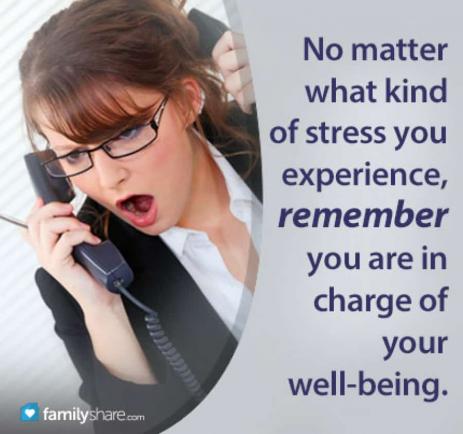
Bob's big presentation for the Board of Directors was coming up. He loves the creative part of his job. It comes easy to him and is where he shines. So he was more than ready for the presentation - he was excited about it. When his wife asked about it, Bob said with a slight smile, "I'm so busy; this is stressful!" He had a long list of tasks of many items on the list were his specialties and he was efficiently planning how he'd get them all done.
Bob was describing "eustress" or positive stress. Eustress is exciting and challenging. It's fun and keeps us feeling vital and alive, like a roller coaster ride. You may be screaming "Oh no! Stop this thing!" when you are actually having fun. We all have eustress at certain points in our lives. While it can be tiring, it's usually not detrimental to our health.
Acute stress
Or what happens in our day-to-day lives when we are stuck in traffic or rushing to meet a difficult deadline at work, can be negative or positive. It's short lived and usually there's an end in sight to feeling overwhelmed. Just knowing the end IS in sight prevents us from becoming completely unglued. But when acute stress runs rampant and goes unchecked, it begins to feel like the norm and can cross the line to "episodic acute stress." Know anybody you consider a "drama queen?" Or how about the gal at work who would "lose her head if it weren't attached?" Both have allowed episodic acute stress to become their way of life.
The type of stress that does the most damage to the body is "chronic stress." Feeling stuck in a job you hate with no way out, trapped in a bad marriage or an ongoing situation that continually keeps you on the edge will create a form of stress that ages the body and exhausts the mind. Watch for symptoms in your body that are calling out to you and asking you to make a change, like when your thoughts are racing, continually "changing frame" in your head or when you notice your heart rate speeding up.
Other signs of chronic stress are feeling nervous, edgy and less joyful; weight gain; stomach trouble; trembling hands; low libido or feeling tired from not being able to get a good, restful night's sleep.
You're in Charge
No matter what type of stress you are experiencing on any given day-remember, you are in charge of your wellbeing if you acquire the skills-you will be able to offset or even prevent damage from occurring in the body.
We can't prevent all stressful situations at work from occurring. But, the goal is for stress to roll off of us like "water off a duck." When we are aware of our own physiological changes that occur when we are nervous, tense or agitated, we have a chance to make the adjustments that keep our system in balance. So it's important to know how your body reacts to nerve-wracking situations.
How Stress is Handled Physically
Stress translates first into tension - stiffness in the neck and shoulders, tightness in the belly and irregular digestion, or maybe low back tightness and pain - and it can occur anywhere from head to toe. If you are in tune with your body and are listening, you are more likely to be able to figure out where you are storing tension.
Here is a quick exercise that can be done anywhere and can significantly improve your health in a myriad ways:
-
First, power down or step away from the "noise" of the moment. Turn away from your desk or close your office door.
-
Clear your mind, feel the quiet, and take a big deep breath. "Feel" or go inside your body, take a trip around starting from the bottoms of your feet working your way up to the top of your head, sensing and noticing how you feel along the way.
-
See if you can locate stiffness, discomfort, or what some perceive as a low-grade buzz or sense of confusion. When you have found a trouble spot, stay there, try to soften the area, release any tension.
-
Breathe in to that spot and on the exhale breath, release the tension as if you were "sending it out" along with the breath. Stay on that spot, until it is relaxed. Then check around again to make sure your face and the back of your neck are relaxed and soft, your shoulders are low, your belly has a sense of peace, your low back, knees and feet are all settled and calm.
-
Then, bring your awareness to what gives you the greatest joy-your greatest gift, or most priceless blessing, and as you feel gratitude for this gift, draw in a big finishing breath, exhaling slowly.
This may take four or five minutes, and after the first three or four times, you will notice it becomes easier and more effective. Soon you'll find that it only takes a few moments to align your spirit. With this exercise, not only will you feel more calm and clear-headed immediately but you are also managing the rate at which your body ages and making a smart investment in your long-term health. Your life at work will become more productive and gratifying.

